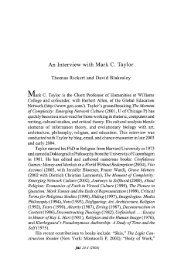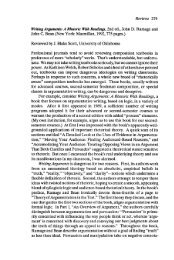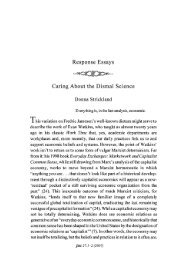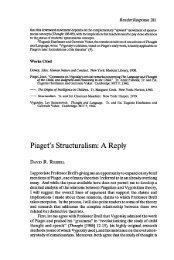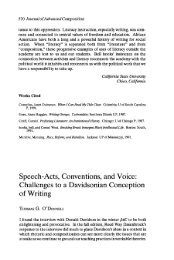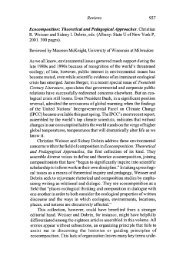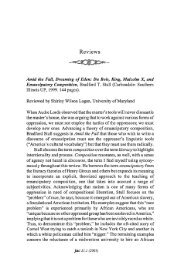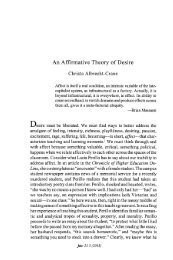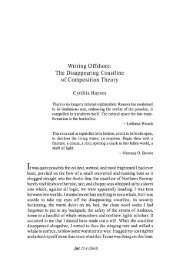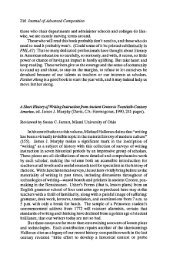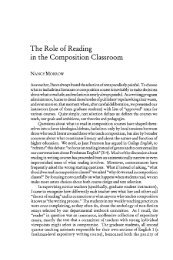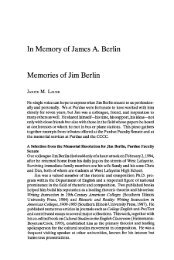Politics, Pedagogy, and the Profession of Composition ... - JAC Online
Politics, Pedagogy, and the Profession of Composition ... - JAC Online
Politics, Pedagogy, and the Profession of Composition ... - JAC Online
You also want an ePaper? Increase the reach of your titles
YUMPU automatically turns print PDFs into web optimized ePapers that Google loves.
Bruce Horner 127<br />
spectrum <strong>of</strong> discursive practices, from diaries, letters, interviews, stories,<br />
biographies, plays, journalism, criticism, <strong>the</strong>ory, <strong>and</strong> so on, as well as<br />
from essays that argue explicitly for <strong>the</strong> correctness <strong>of</strong> a certain public<br />
agenda. [Thus] <strong>the</strong>re is no reason to limit student writing to issues <strong>of</strong><br />
politics in order to do justice to <strong>the</strong> political character <strong>of</strong> language. (10)<br />
This is a very tempting argument. First, it allows teachers to claim to<br />
practice what Seitz, borrowing from Rol<strong>and</strong> Bar<strong>the</strong>s, terms a "discreet"<br />
politics in <strong>the</strong>ir teaching while <strong>of</strong>fering <strong>the</strong> possibility <strong>of</strong> avoiding <strong>the</strong> fate<br />
<strong>of</strong>Brodkey, her colleagues, <strong>and</strong> English 306 (Seitz 7-8). Second, it is<br />
more consistent with <strong>the</strong> view <strong>of</strong> <strong>the</strong> ubiquity <strong>of</strong><strong>the</strong> "political," a view to<br />
which many writing teachers subscribe. Third, it increases <strong>the</strong> likelihood<br />
that attention is given to issues that are not already demarcated by <strong>the</strong><br />
dominant as political but whose political effects are <strong>of</strong>ten felt by <strong>the</strong><br />
marginalized. As Carmen Luke observes, "For many women, substantive<br />
political problems <strong>of</strong>ten are private <strong>and</strong> not <strong>the</strong> same as those deemed as<br />
public, common interest" ("Feminist <strong>Politics</strong>" 36). The political sphere,<br />
like <strong>the</strong> public sphere with which it is associated, is one defined <strong>and</strong><br />
controlled by <strong>the</strong> dominant group <strong>and</strong> hence is likely to exclude consideration<br />
<strong>of</strong><strong>the</strong> politics <strong>of</strong> what <strong>the</strong> dominant group has defined as "private."<br />
Thus, focusing on <strong>the</strong> politics in all discursive practices makes it possible<br />
to address how what is commonly defined as <strong>the</strong> personal is, indeed,<br />
political. Finally, this strategy may be more promising pedagogically (in<br />
that it engages students in <strong>the</strong> politics <strong>of</strong> writing) than a course devoted<br />
to <strong>the</strong> topic <strong>of</strong> social oppression, conventionally understood, since conventional<br />
political topics may encourage a highly restricted <strong>and</strong> conventional<br />
political discourse. Seitz reports that students taking a course about<br />
social oppression-many <strong>of</strong><strong>the</strong>m victims <strong>of</strong> such oppression-ended up<br />
complaining about <strong>the</strong> restricted nature <strong>of</strong> that discourse, pleading,<br />
"Aren't we going to deal with anything besides oppression?" (9). Conversely,<br />
a course addressing <strong>the</strong> politics <strong>of</strong> discursive practices conventionally<br />
defined as apolitical may enable students to see <strong>the</strong> use value <strong>of</strong><br />
<strong>the</strong>ir explorations <strong>of</strong> discursive practices.<br />
There is a danger in pursuing <strong>the</strong> "discreet" politics <strong>of</strong> this strategy,<br />
however-a danger that arises from <strong>the</strong> dilemma posed to those who do<br />
accept <strong>the</strong> ubiquity <strong>of</strong> <strong>the</strong> political. Like those who accept an Althusserian<br />
view <strong>of</strong> ideology, that view can appear to preclude teaching any particular<br />
politics or ideology, whe<strong>the</strong>r espoused in writing or enacted through its<br />
rhetoric. That is, <strong>the</strong> discreet politics <strong>of</strong> this pedagogy may remain<br />
"discreet"-that is, something that students <strong>and</strong> teachers do not directly



